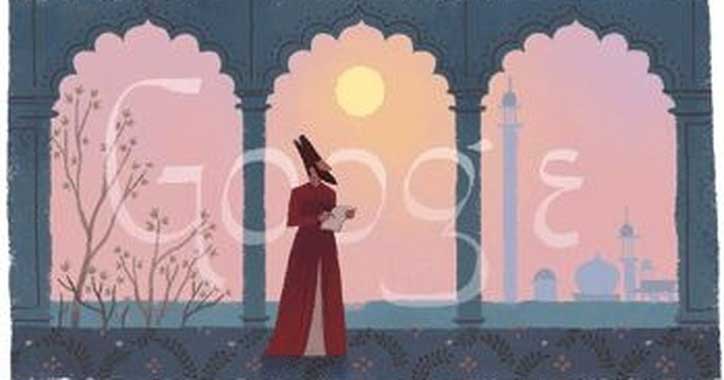 New Delhi:
New Delhi: Google on Wednesday celebrated poet Mirza Ghalib's 220th birth anniversary with a doodle. A poet in Urdu and Persian languages during the Mughal era, Ghalib became famous for his Urdu ghazals. His poems and ghazals have been translated and recited in many languages.
Mirza Asadullah Beg Khan, who later adopted the pen name, Mirza Ghalib, has forever been the last word in invoking the poetry that life is.
His poignant musical verse has melted hearts every time, across generations-transcending all barriers of language or race. Overwhelming as it is, the romantic in Ghalib has repeatedly found expressions over the ages, through all forms of media--be it through the hypnotic renditions of ghazal maestros or through adaptations in films and theatre.
Ghalib was the poet tutor to the Mughal emperor Bahadur Shah Zafar’s eldest son. He was also appointed the royal historian of the Mughal court. In 1850, he was honoured with the title of Dabir-ul-Mulk by the emperor.
Born Mirza Asadullah Baig Khan on December 27, 1797, in Agra, Ghalib started composing poems from the age of 11. After getting married at the age of 13, he settled in Delhi. His poems are tragic and usually have a recurring theme that life is a continuous struggle that ends only with death. Read three Ghalib love poems here.
However, his contributions to Urdu poetry and prose were not fully appreciated in his lifetime. Much of his fame came to him posthumously.
Ghalib died on February 15, 1869. His house in Old Delhi has been turned into a memorial.
On his birth anniversary, let us now commemorate this great legend, by revisiting his idea of love and romance, in his very own words.
1. Unke dekhne se jo aa jaati hai muh par raunaq
Woh samajhte hai ke beemaar ka haal achchha hai
Translation: On seeing her my face brightens up
She presumes the condition of the sick lover is better now
2. Hamko unse wafa ki hai ummeed
Jo naheen jaante wafa kya hai
Translation: I hope for faith from one
Who doesn't know what it means to be faithful
3. Mohabbat mein nahi hai farq jeene aur marne ka
Usi ko dekh kar jeetey hain jis kaafir pe dam nikle
Translation: In love there is no difference between life and death do know
The very one for whom I die, life too does bestow
4. Yeh na thi hamari qismat ke visal-e-yaar hota
Agar aur jeetey rehte yahi intezaar hota
Translation: That my love be consummated, fate did not ordain
Living longer had I waited, would have been in vain
5. Dil hii to hai na sang-o-Khisht dard se bhar na aaye kyun
Roenge ham hazaar baar koii hamen sataaye kyun
Translation: It's just a heart, no stony shard; why shouldn't it fill with pain
I will cry a thousand times,why should someone complain?
 New Delhi: Google on Wednesday celebrated poet Mirza Ghalib's 220th birth anniversary with a doodle. A poet in Urdu and Persian languages during the Mughal era, Ghalib became famous for his Urdu ghazals. His poems and ghazals have been translated and recited in many languages.
New Delhi: Google on Wednesday celebrated poet Mirza Ghalib's 220th birth anniversary with a doodle. A poet in Urdu and Persian languages during the Mughal era, Ghalib became famous for his Urdu ghazals. His poems and ghazals have been translated and recited in many languages.